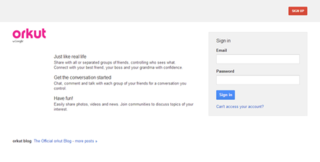Trillian is a proprietary multiprotocol instant messaging application created by Cerulean Studios. It is currently available for Microsoft Windows, Mac OS X, Linux, Android, iOS, BlackBerry OS, and the Web. It can connect to multiple IM services, such as AIM, Bonjour, Facebook Messenger, Google Talk (Hangouts), IRC, XMPP (Jabber), VZ, and Yahoo! Messenger networks; as well as social networking sites, such as Facebook, Foursquare, LinkedIn, and Twitter; and email services, such as POP3 and IMAP.
Social software, also known as social apps or social platform includes communications and interactive tools that are often based on the Internet. Communication tools typically handle capturing, storing and presenting communication, usually written but increasingly including audio and video as well. Interactive tools handle mediated interactions between a pair or group of users. They focus on establishing and maintaining a connection among users, facilitating the mechanics of conversation and talk. Social software generally refers to software that makes collaborative behaviour, the organisation and moulding of communities, self-expression, social interaction and feedback possible for individuals. Another element of the existing definition of social software is that it allows for the structured mediation of opinion between people, in a centralized or self-regulating manner. The most improved area for social software is that Web 2.0 applications can all promote co-operation between people and the creation of online communities more than ever before. The opportunities offered by social software are instant connections and opportunities to learn.An additional defining feature of social software is that apart from interaction and collaboration, it aggregates the collective behaviour of its users, allowing not only crowds to learn from an individual but individuals to learn from the crowds as well. Hence, the interactions enabled by social software can be one-to-one, one-to-many, or many-to-many.

Orkut was a social networking service owned and operated by Google. The service was designed to help users meet new and old friends and maintain existing relationships. The website was named after its creator, Google employee Orkut Büyükkökten.

LinkedIn is a business and employment-focused social media platform that works through websites and mobile apps. It was launched on May 5, 2003. Since December 2016, it has been a wholly owned subsidiary of Microsoft. The platform is primarily used for professional networking and career development, and allows jobseekers to post their CVs and employers to post jobs. From 2015 most of the company's revenue came from selling access to information about its members to recruiters and sales professionals. LinkedIn has more than 930 million registered members from over 200 countries and territories.
Social computing is an area of computer science that is concerned with the intersection of social behavior and computational systems. It is based on creating or recreating social conventions and social contexts through the use of software and technology. Thus, blogs, email, instant messaging, social network services, wikis, social bookmarking and other instances of what is often called social software illustrate ideas from social computing.

Cyworld (Korean: 싸이월드) is a South Korean social network service. Cyworld was originally part of SK communication, and became an independent company in 2014. Members cultivate relationships by forming Ilchon or "friendships" with each other through their minihompy. Avatars and "mini-rooms" are features of the service, which can make for a Sims-like experience.
A social networking service or SNS is a type of online social media platform which people use to build social networks or social relationships with other people who share similar personal or career content, interests, activities, backgrounds or real-life connections.
BuzzNet is a photo, journal, and video-sharing social media network that is currently owned by Hive Media. The network was owned by SpinMedia from its inception until September 2016, when it was sold to Hive Media.
The Deleting Online Predators Act of 2006 (DOPA) is a bill brought before the United States House of Representatives on May 9, 2006 by Republican Pennsylvania Representative (R-PA) Mike Fitzpatrick. The bill, if enacted, would have amended the Communications Act of 1934, requiring schools and libraries that receive E-rate funding to protect minors from online predators in the absence of parental supervision when using "Commercial Social Networking Websites" and "Chat Rooms". The bill would prohibit schools and libraries from providing access to these types of websites to minors or create restrictions to use of these type of sites. The bill also would require the institutions to be capable of disabling the restrictions for "use by an adult or by minors with adult supervision to enable access for educational purposes."
Microblogging is a form of blogging using short posts without titles known as microposts. Microblogs "allow users to exchange small elements of content such as short sentences, individual images, or video links", which may be the major reason for their popularity. Some popular social networks such as Twitter, Mastodon, Tumblr, Koo, and Instagram can be viewed as collections of microblogs.

Seesmic was a suite of freeware web, mobile, and desktop applications which allowed users to simultaneously manage user accounts for multiple social networks, such as Facebook and Twitter.

The Renren Network, formerly known as the Xiaonei Network, is a Chinese social networking service similar to Facebook. It was popular among college students. Renren Inc. has its headquarters in Chaoyang District, Beijing, with additional offices in Shanghai and Guangzhou. Renren had an $740m initial public offering (IPO) on the New York Stock Exchange in April 2011.
Fotki is a digital photo sharing, video sharing and media social network website and web service suite; it is one of the world's largest social networking sites. As an image hosting service, Fotki licenses photo-sharing software for global companies such as Telecom Italia, Alice.it, Sears, Mark Travel, Vegas.com, and Funjet.com, among others.

Bebo was an American social networking website that originally operated from 2005 until its bankruptcy in 2013 and relaunched in February 2021. The site relaunched several times after its bankruptcy with a number of short-lived offerings, including instant messaging and video streaming, until its acquisition by Amazon in July 2019 when it was shut down. It was announced in January 2021 that it would be returning as a new social media site the month after. By May 2022, it had once again been shut down, without having ever left beta testing.

Nexopia is a Canadian social networking website created in 2003, by Timo Ewalds. It was designed for ages 14 and up, but was later lowered to 13. Users are able to create and design profiles, a friends list, blogs, galleries, and compose articles and forums. Interaction is accomplished through an internal personal messaging system, public user comments on profiles, blogs or through threads and posts on the forums. In November 2012, Nexopia was acquired by digital ad network Ideon Media.
Koobface is a network worm that attacks Microsoft Windows, Mac OS X, and Linux platforms. This worm originally targeted users of networking websites like Facebook, Skype, Yahoo Messenger, and email websites such as GMail, Yahoo Mail, and AOL Mail. It also targets other networking websites, such as MySpace, Twitter, and it can infect other devices on the same local network. Technical support scammers also fraudulently claim to their intended victims that they have a Koobface infection on their computer by using fake popups and using built-in Windows programs.
Plazes AG was a Berlin, Germany-based geosocial networking site. Plazes allowed users to post their location and current activities and share this information with other Plazes users via computers or mobile telephones. On 23 June 2008, Nokia Corporation announced plans to acquire Plazes. Plazes was subsequently integrated to Nokia Maps which itself was integrated to HERE Maps.

Multiply was a social networking service with an emphasis on allowing users to share media – such as photos, videos and blog entries – with their "real-world" network. The website was launched in March 2004 and was privately held with backing by VantagePoint Venture Partners, Point Judith Capital, Transcosmos, and private investors. Multiply had over 11 million registered users. The company was headquartered in Boca Raton, Florida but moved to Jakarta, Indonesia early in 2012 and recently announced intentions to switch to e-commerce, dropping the social networking aspect entirely. Quantcast estimates Multiply had 2.47 million monthly U.S. unique visitors at their peak on July 30, 2012.
Spring.me was a social networking service. Until a rebranding in 2013, it was known as Formspring, a question-and-answer-based social network launched in 2009 by Ade Olonoh, the founder of online form builder Formstack.

Mastodon is a free and open-source software for running self-hosted social networking services. It has microblogging features similar to Twitter, which are offered by a large number of independently run nodes, known as instances or servers, each with its own code of conduct, terms of service, privacy policy, privacy options, and content moderation policies.








